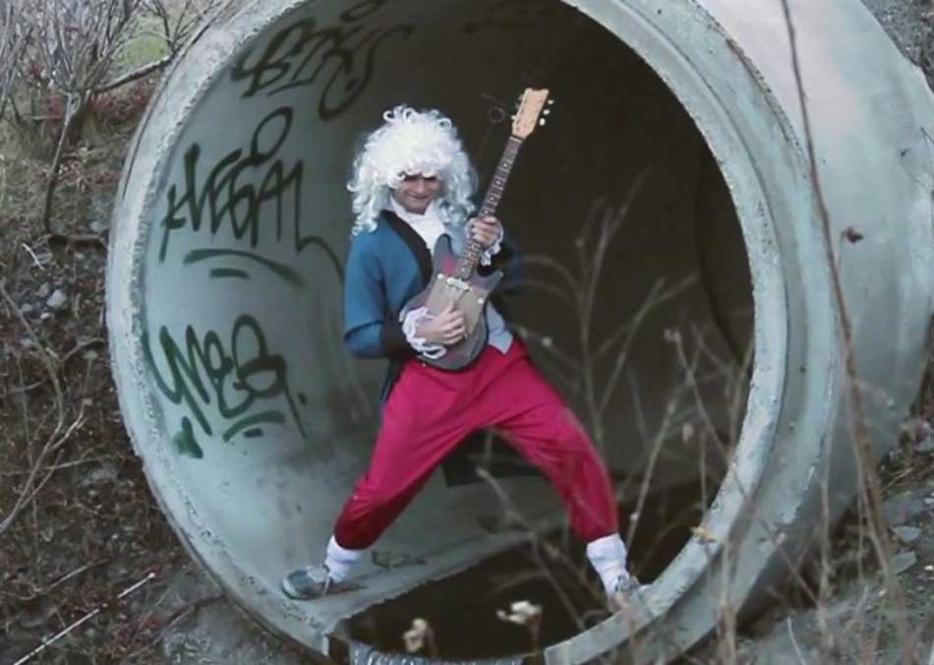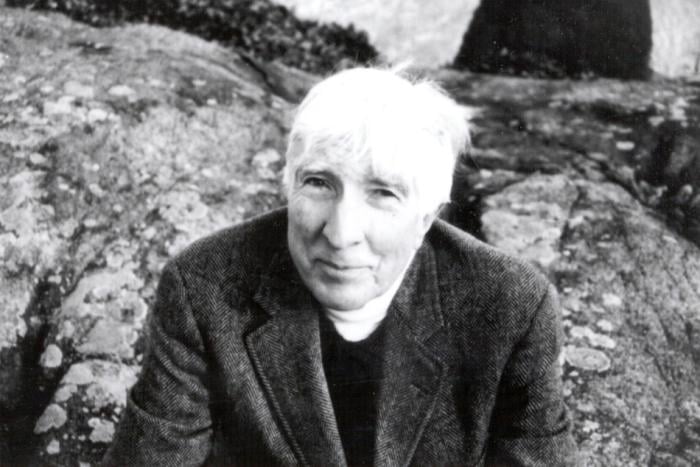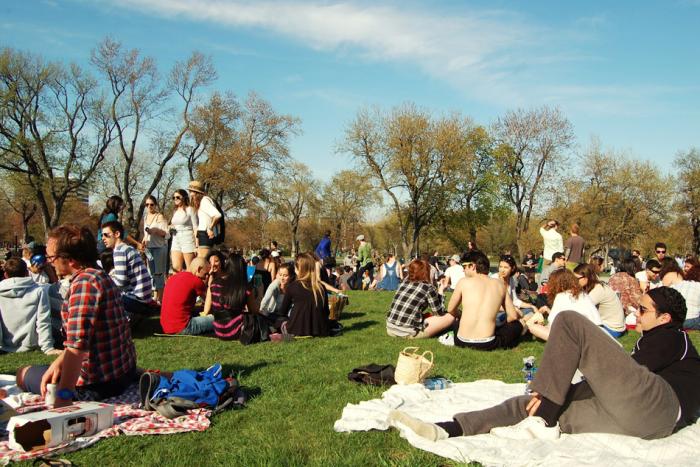The website Weird Canada was founded in 2009 in Edmonton, with the purpose of showcasing the obscure, “anomalous,” and experimental music being made across the country. Unexpectedly, in 2011, they were nominated as part of CBC Radio 3’s Searchlight competition for Best Canadian Music Website. The weirdest thing happened—they actually won.
For a site devoted to fringe music (anything from free jazz to lo-fi tropicalia to noise punk) to overcome heavyweight publications like Exclaim! is no mean feat, and the operators of Weird Canada didn’t take the honour lightly. Since winning the contest, Weird Canada has taken its mission statement—“to encourage, connect, and document creative expression across Canada”—and stretched as far as it can reach. In the last year, they’ve registered as a non-profit organization, recruited over 100 volunteers, including the translators necessary to present all the “hyperbolic nonsense” in French and English, and won a $50,000 grant to create a nationwide service called “WYRD DISTRO” that allows music fans everywhere to easily access and purchase physical releases from the bands streaming on the website. It may self-identify as “weird,” but WC has slowly, almost accidentally, become a very serious champion of the musical underdog and patron of open and accessible arts.
This Friday and Saturday, in Montreal and Toronto respectively, Weird Canada presents Wyrd IV, a pair of concerts that will unite disparate artists for unique collaborations and “exploratory weirdness.” Isla Craig will flesh out her a capella soul with a team of four vocalists as Soul Supreme Redux 2.0 and Zachary Fairbrother (of punk band Lantern) will conduct a “guitar feedback orchestra,” while ethereal folk singer Jennifer Castle will join with psychedelic introvert Wyrd Visions for a rare spacey duet.
That provided the perfect opportunity for Hazlitt to sit down with now Toronto-based founder Aaron Levin and Executive Director Marie Leblanc Flanagan to discuss accessibility, openness, grant funding controversies, and Weird Canada’s desire to “open source the world.”
Weird Canada has had an extremely busy year. Where did all that productivity come from?
Marie: The moment we decided to take it more seriously and be more formalized about it was when we won the CBC Radio 3 Searchlight contest. When we were nominated we had a little laugh about it and then we thought, you know what, maybe we should take this seriously and try to win it. Maybe it’ll give us some credibility, finally get us a grant. Maybe people wearing suits will care about us. Then when we won it, it was a realization that, oh, there’s a real community out there and it’s hungrier and stronger than we imagined. If they love and value what we do that much, the least we could do is return that in the seriousness and scope of which we operate.
So did you sit down and decide “this is what we want to accomplish?”
Marie: We spent about a year thinking about the things we want to work on. Then last summer we formalized our dreams into a 35 item list and we’ve been working to tick them all off.
Aaron: As soon as we signed on to this mandate, as soon as we set up goals for ourselves like translation, inclusiveness, quashing homophobia and misogyny—that really changed the way we thought about our actions. Things became more calculated, things became more thoughtful and there was more dialogue. A lot of positive things came from it.
In part because of the name, people might think of Weird Canada as a less serious operation than it’s shaping into. Is it at a point where you’re trying to prove yourself?
Aaron: Personally, one of the things that makes me happy about Weird Canada is that we take ourselves so seriously—and it’s hilarious. For instance, someone will come to us with an idea like, “do you want to sponsor this weird show in an illegal venue?” and we’ll say, “we’re going to have to have a meeting about that. Is it in line with our objectives, is it accessible and inclusive, should we actually be working on the illegal show in the other venue?” So we definitely do take the work really seriously, and I think that the results show for themselves with the growth and the authority that continues to build.
A lot of the more experimental and off-kilter stuff you promote would often have a hard time transcending its local underground music scene. One of your goals is to bridge the gap between those geographically disparate communities. Is that what your upcoming distribution system, WYRD DISTRO, is about?
Aaron: Absolutely. A lot of the things that we write about are, quite frankly, impossible to buy. You can’t find it in a record store because stocking it would be outrageous and the sheer vastness of them in existence is overwhelming. You can’t grab it online at any store because no distributors are carrying it. You have to go directly to the artist, and that’s not always a cost efficient experience. What we want to do is create a central repository where people can sanely purchase the vast amount of incredible, self-released music in Canada, and we hope that by creating such a repository record stores will be able to carry them in financially sane ways.
You recently won a $50,000 grant from FACTOR to create this service. Was that a tough process?
Aaron: Yes, it was. Not because of our own internal organization, but because granting is a very foreign activity to the way that do-it-yourself arts culture works. For instance, when a DIY promoter puts on a show, they think what’s the cheapest possible way I can do this? I can draw the poster by hand with a pencil and I can do a hundred of them. I can poster around town by using found staples, I can use a free venue, and then I can work the door and I’ll do the sound and I’ll pay the bands. So when this DIY promoter then wants to apply for a grant and the grant says “what’s your promotion budget?” they say “that depends, can I get free paper from the recycling bin?”
Your grant win became part of a broader conversation around FACTOR (a non-profit foundation that provides financial support to Canadian music artists) and some of the criticisms directed toward it, such as at the controversial Slagging Off blog.
Aaron: We’re all for criticism. We’re all for providing analysis, and scathing analysis, of these organizations. But the tone and the misplaced context, the derisive nature towards indie bands, which in our opinion has nothing to do with the conversation at all, really took that dialogue into a place that was divisive and unproductive. And for myself, personally, disheartening and saddening. So one strategy is definitely publishing and being openly critical of the system, and doing it in a constructive way, which is important. Not only saying “this thing sucks,” but explaining “it sucks, and here’s what would make it better.”
You’ve been critical of the tone of the discussion, but one of the things it did accomplish was to open up the conversation around granting, which seems to be in line with your objective of “open sourcing the world.” Is that why you decided to post your grant application online?
Aaron: One of the big hurdles we found while writing the grant is not really knowing what the granting agencies are looking for, reading these pages and pages of definitions and needs, but not having any idea of what the finished product should look like. Being able to read a completed grant makes the application process so much easier, so what we did is put our grant online and started to reach out to musicians to send us their grants so we can create a repository of them. Dan Mangan is hopefully sending in a couple of his soon.
Marie: We know that the pool of money can only go to a certain number of people and that by sharing grant applications we may be diminishing our future chances of getting a grant. But we believe enough in our ideas to think that if we do have a good idea it will get funded, and if other people have better ideas or want to do the things that we want to do better than us we want to let them. Even if they’re using our grant template.
You’ve also said the solution to some of the FACTOR critique would be to fund the eco-system that creates art rather than the artists themselves. That seems especially pertinent now that the Ontario government has announced they’re creating a $45 million music fund.
Aaron: When you fund these resources instead of funding the projects, the decision on where the money goes ceases to become a subjective one and instead becomes one where you’re empowering more people to create art, rather than deciding which art should be made. Right now, for example, musicians can apply to get an album funded, or a music video funded, or an album recorded. Instead of spending $10,000 on 50 videos, you could spend like $500,000 on funding an organization that teaches filmmakers how to film, gives filmmakers access to film equipment, and has a program where as a part of the learning process they work with a musician to film a video. Or fund a recording studio that is open to the public where bands can come in and record by scheduling time with them, where it can also be an educational resource for new sound engineers who want to learn their craft and trade.
Marie: It’s a controversial opinion because in some ways we are saying that less money should go to artists, and that’s definitely not what we want.
Aaron: If the way you define success is return on your investment then, yeah, fund Bieber. He’ll give you way more money than any other Canadian musician on the planet.But if your metric for success is supporting a sustainable arts community, then it’s a whole other conversation. Because we live in a capitalist economy the discussion inevitably comes back to who pays for what and how much it costs, and therefore the granting agencies and government agencies look at moneymaking businesses. And people making noise music on cassette in Ponoka, Alberta are never going to be a moneymaking business.
There seems to be this weird shift now where the fringe musicians that you were championing early on—like Grimes, Purity Ring, and Majical Cloudz—are starting to break out and sign to big labels. Have people started to look to you as a “tastemaker?”
Marie: Internally, I would say, the people that sign on to Weird Canada, the new writers, the new volunteers, are completely unexcited about the next big thing and more about the next hundred big things. Like, there’s a volunteer in Nunavut. They’re entering a candy store of stuff that wasn’t available to them before.
Aaron: Right now we’re super excited to see Sean Nicholas Savage breaking through. The very first post on Weird Canada was Sean Nicholas Savage’s “Summer 5000,” so we’re super excited about that. We’re really encouraged about all the press about a band that will complete the group of expats from Edmonton, and that’s Mac DeMarco. We’re so excited to see him growing and shining. And we’re actively encouraging the soon-to-be behemoth that is Thom Gill. We are still banking he’ll set the entire world on fire.
Richard Trapunski is a Toronto freelance writer who writes about indipendent arts, culture and music for publications like NOW Magazine, The Globe & Mail, SPIN and writes a monthly column for AUX Magazine. He has spent more hours than he's willing to count destroying his eardrums in packed dive bars, for journalism.





